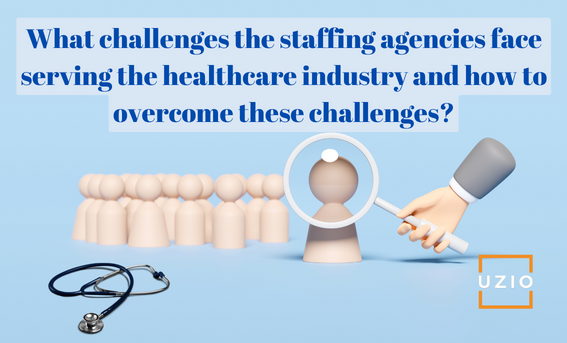
What challenges the staffing agencies face serving the healthcare industry and how to overcome these challenges?
Quick links
-
Introduction
-
Challenges of serving the healthcare industry
-
1. High demand and restricted pool of healthcare workers
-
2. Regulation and compliance
-
3. Liability issues
-
4. Lack of adoption of technology
-
Conclusion
Introduction
The healthcare industry is a major market for the staffing industry. According to the American Staffing Association, the staffing industry generated $153 billion in sales in 2020, with the healthcare sector accounting for a significant portion of that revenue.
However, serving the healthcare industry can be challenging due to its unique nature. In this article, we will discuss some of the challenges staffing agencies face in this market and how they can overcome them.
Challenges of serving the healthcare industry:
1. High demand and restricted pool of healthcare workers:
With an aging population, the demand for healthcare workers is increasing, making it difficult for staffing agencies to find qualified candidates to fill open positions. This challenge is exasperated by the fact that there is a severe shortage of qualified healthcare professionals.
Here are a few strategies that staffing agencies can use to overcome this challenge:
a. Expand their pool of qualified candidates:
Staffing agencies can work to expand their pool of qualified candidates by partnering with schools and universities, networking with industry professionals, and offering training and development programs.
b. Explore international recruitment:
Staffing agencies can explore international recruitment as a way to find qualified nurses and doctors to fill open positions. For example the Philippines is a major source of international nurses for the US. According to the Commission on Graduates of Foreign Nursing Schools, around 25% of internationally educated nurses working in the US are from the Philippines.
c. Explore hiring recently retired professionals:
Healthcare professionals who have recently retired can be a good source of talent. Staffing agencies should target recently retired professionals and attract them back to the workforce to fill in at least the part-time positions.
d. Offer competitive compensation and benefits:
The top talent in the healthcare industry is in high demand. Offering competitive compensation and benefits can help staffing agencies attract and retain top talent. With the rise in inflation, healthcare professionals expect their compensation to be revised upwards on a regular basis.
2. Regulation and compliance:
The healthcare industry is heavily regulated, and staffing agencies must ensure that they are compliant with all relevant laws and regulations, which can be time-consuming and costly.
Here are some steps staffing agencies can take to remain compliant of the healthcare industry regulations:
a. Understand relevant regulations:
It’s important for staffing agencies to have a thorough understanding of all relevant regulations, including laws governing healthcare staffing, employment, and immigration.
b. Implement policies and procedures:
Staffing agencies should implement policies and procedures to ensure compliance with relevant regulations. This may include establishing processes for verifying the qualifications and licenses of healthcare professionals, conducting background checks, and maintaining accurate records.
c. Train employees:
Staffing agencies should ensure that all employees, including recruiters and HR staff, are trained on relevant regulations and the importance of compliance.
d. Monitor and review practices:
Staffing agencies should regularly review their practices to ensure compliance with relevant regulations, and make any necessary changes to stay in compliance.
e. Stay up-to-date on changes to regulations:
It’s important for staffing agencies to stay up-to-date on any changes to regulations, and to make any necessary changes to their practices to remain compliant.
3. Liability issues
Staffing agencies may be held liable for the actions of the healthcare professionals they place, which can be a risk for the agency.
Here are the steps the agencies can take to avoid or minimize the liability issues:
a. Carefully screen and vet candidates:
Staffing agencies should carefully screen and vet candidates to ensure that they are qualified and have the necessary education, training, and licenses to practice in the healthcare field.
b. Conduct background checks:
Staffing agencies should conduct thorough background checks on candidates to identify any issues that may make them unsuitable for placement in a healthcare setting.
c. Provide ongoing training and support:
Staffing agencies should provide ongoing training and support to the healthcare professionals they place, to ensure that they are competent and up-to-date on industry standards and best practices.
d. Establish clear contracts and policies:
Staffing agencies should establish clear contracts and policies outlining the roles and responsibilities of the healthcare professionals they place, as well as any liabilities or obligations of the agency.
e. Communicate with clients:
Staffing agencies should maintain open lines of communication with clients to stay informed about any concerns or issues that may arise, and take steps to address them promptly.
f. Obtain liability insurance:
Staffing agencies should consider obtaining liability insurance to protect against potential claims.
4. Lack of adoption of technology:
The lack of adoption of technology has hindered staffing agencies’ efforts to efficiently serve the healthcare industry. For instance, in the highly competitive landscape for attracting and retaining talent, staffing agencies should utilize state-of-the-art technology solutions to streamline their front and back office operations. This will enable them to attract and retain top talent, compared to companies that rely on manual or outdated systems.
Conclusion
By implementing the recommendations outlined above, staffing agencies will be able to overcome the challenges they face in serving their healthcare clients and take advantage of this growing and profitable market.
Get in touch with us for an expert-led demo to know more about UZIO payroll services.





